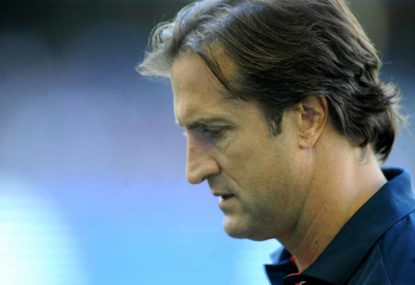'Solidified the statement': Cornes doubles down on Bevo whack despite Dogs' 10-goal win
"It's amazing when you actually play Bailey Dale."

On 14 November, 2014, a depleted Western Bulldogs team signed former Collingwood development coach and Hawthorn assistant Luke Beveridge.
687 days later, the battlers for so long had the majority of Victoria barracking for a fairytale. And it happened.
Beveridge already goes down in Bulldogs (and AFL) folklore as a spectacular coach. People have ambitiously touted him to be in the same league as Jock Mchale and Ron Barassi.
And why not? Old Brendan McCartney started a fast game plan that didn’t attract massive hype, yet Luke Beveridge made it work.
Rewind the AFL world to the end of 2014. The Hawks had just completed a repeat with media harassing the players asking, how about a threepeat?
On the other end of the spectrum were the Doggies. An end of the spectrum their fans are all too accustomed to being in.
Finishing 14th, with seven wins was about par in relation to where the competition expected them to finish. But when coach Brendan McCartney was basically sacked, the Dogs were without a coach.
A coach who foresaw a premiership and was building one, was shown the door. Ryan Griffen, their courageous captain confirmed he wanted to be traded to the orange and charcoal.
The controversial trade that followed saw them acquire a GWS young prospect whose name had been floated around living rooms as the No.1 draft pick, but no-one quite knew what he was made of.
A veteran of over 200 games was virtually directly swapped for a young player with nine games experience who didn’t show enough, seemingly, to be worth the price paid.
When Luke Beveridge was announced as Western Bulldogs senior coach in November, the Dogs at least had a coach.
Luke Beveridge blooded back a better vibe around the club, giving some hope and temporary enjoyment at least for diehards. Veterans, notably Bob Murphy, noted how hard the preseason was compared to others gone by.
From all reports he was an affirmative coach who would give you the truth. Nothing but the truth. The harder you worked to improve, the more he’ll help.
A basic, old-school method, but it was more than that. It was deeper. He built tremendous relationships with each member of the kennel.
This was most significantly on display after the siren yesterday. Marcus Bontempelli pouring Gatorade over his boss with both taking it light-heartedly.
His ability to crack a random joke with each player is on display each time the dogs face the media, now that he can take a step back.
A Tom Liberatore injury saw the reigning best-and-fairest go down and out for the year, starting 2015 on the wrong foot.
That aside, the year started positively with four positive wins from five games and the Dogs outfit played with the grit that they were so well known for before it disappeared without a trace.
Despite losing four of their next five, we were still yet to see the now trademark ‘dummy spit’ from Beverdige. He seemed unharmed emotionally by the losses, knowing things were on the rise. Four positive wins followed which saw countless goals generated from perpetual speed by the Doggies.
Usually if players or support staff don’t like the coach, it starts to leak into the media – but nothing sour was said about Beveridge.
Their ability to win some games ugly was significant, an improvement from the previous years. It is something that the good teams can produce instinctively while the bad teams run out of energy.
By this time, Luke Beveridge had got the Dogs into a position where a finals spot was theirs to lose – not an expected event pre-season. Five more times in eight weeks, ‘sons of the west’ was sung. Luke Beveridge was a genuine shot at coach of the year glory.
Unfortunately, they were knocked straight out of the finals but that doesn’t deserve to sour a great year. The start of a meteoric rise to the top for Footscray of old.
Luke Beveridge had started training his guys to the future of the game that year. Quick ball movement, get over the back and setup goals with the opposition yet to blink.
Admittedly, he didn’t invent that part, but was certainly the first coach to train his team to do quick, position-less hand-balls.
He will always be the first person to coach his players successfully how to remain in control while pressure-hand-balling from all sorts of positions.
Check back tomorrow for part 2.